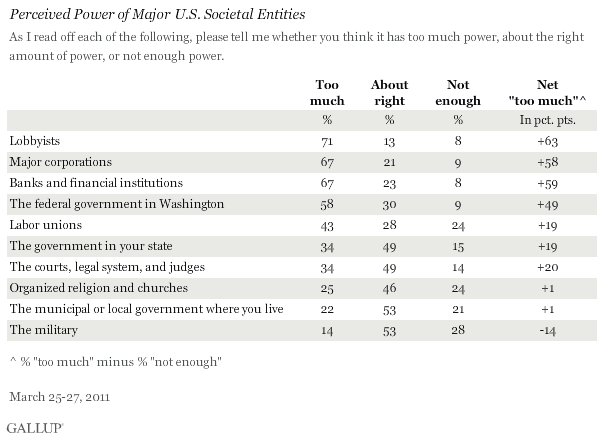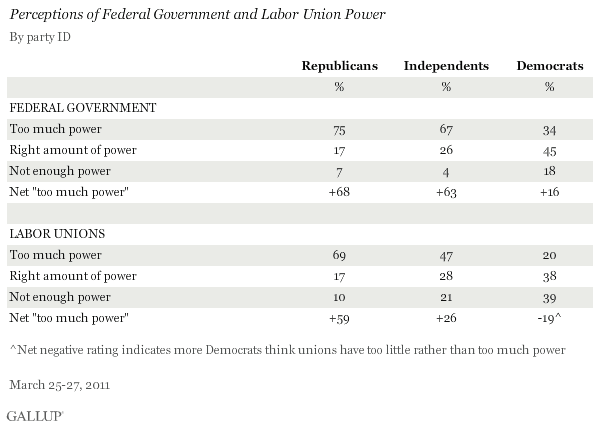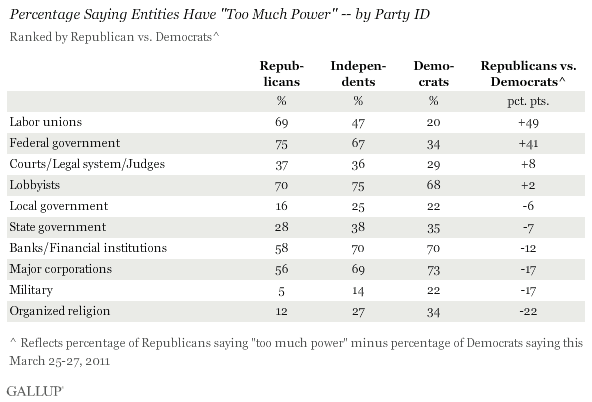PRINCETON, NJ -- Lobbyists, major corporations, banks, and the federal government all have too much power, according to Americans. By contrast, the public largely believes state and local governments, the legal system, organized religion, and the military each have the right amount of power or too little power. Labor unions elicit mixed responses, with the plurality saying they have too much power, but a slim majority saying their power is about right or lacking.

The findings come from a Gallup poll conducted March 25-27.
While relatively few Americans believe any of these major societal players have too little power, roughly one in four say labor unions, organized religion, and the military are deficient in this regard. Only about the military do more people say it has too little rather than too much power, 28% vs. 14%.
Federal Government, Unions Sharply Divide Partisans
Heated debates over the power of government and labor unions have dominated U.S. political news this year. Several state governors are in conflict with public employee unions over how much power unions should have in the collective bargaining process, while on the federal level, Republicans have been battling with Democrats over the proper size and scope of government.
Not surprisingly, rank-and-file Republicans and Democrats have sharply diverging views about the power wielded by the federal government and labor unions. Republicans are more than twice as likely as Democrats to say the federal government has too much power, and less than half as likely to say it has too little power, resulting in very different net "too much power" scores: +68 for Republicans vs. +16 for Democrats.
The partisan differences are even starker with respect to labor unions. Republicans are significantly more likely to think unions have too much power rather than too little power, resulting in a net +59 "too much power" rating. Democrats, on balance, think unions have too little power, with a -19 net rating.
The political views of independents typically fall halfway between Republicans' and Democrats' views, and that is the case with respect to perceptions of the power of labor unions. Forty-seven percent of independents say labor unions have too much power, close to the average of Republicans' 69% and Democrats' 20%. By contrast, independents' views about the power of the federal government are remarkably close to Republicans': 67% of independents and 75% of Republicans say the federal government has too much power, versus 34% of Democrats.

Democrats are somewhat more likely than Republicans to see organized religion, the military, major corporations, and banks as too powerful. The two party groups' views on the courts, lobbyists, local government, and state government are about the same.

Bottom Line
Americans generally agree that lobbyists, major corporations, and banks have too much power, potentially making them vulnerable to calls for greater regulation. The federal government is close behind, with 58% calling it too powerful -- including large majorities of Republicans and independents.
Attitudes about labor unions are the most ambiguous of all 10 entities measured: while nearly half of Americans (43%) say unions have too much power, a fairly hefty 24% say they have too little power, leaving just 28% who consider their power about right.
The survey results highlight the major gulf between Democrats' and Republicans' views on unions and the federal government. Republicans are highly likely to say both have too much power, while Democrats are much less likely to believe either has too much power and, in fact, tend to believe unions have too little power.
Survey Methods
Results for this Gallup poll are based on telephone interviews conducted March 25-27, 2011, with a random sample of 1,027 adults, aged 18 and older, living in the continental U.S., selected using random-digit-dial sampling.
For results based on the total sample of national adults, one can say with 95% confidence that the maximum margin of sampling error is ±4 percentage points.
Interviews are conducted with respondents on landline telephones (for respondents with a landline telephone) and cellular phones (for respondents who are cell phone-only). Each sample includes a minimum quota of 150 cell phone-only respondents and 850 landline respondents, with additional minimum quotas among landline respondents for gender within region. Landline respondents are chosen at random within each household on the basis of which member had the most recent birthday.
Samples are weighted by gender, age, race, education, region, and phone lines. Demographic weighting targets are based on the March 2010 Current Population Survey figures for the aged 18 and older non-institutionalized population living in continental U.S. telephone households. All reported margins of sampling error include the computed design effects for weighting and sample design.
In addition to sampling error, question wording and practical difficulties in conducting surveys can introduce error or bias into the findings of public opinion polls.
View methodology, full question results, and trend data.
For more details on Gallup's polling methodology, visit www.gallup.com.
